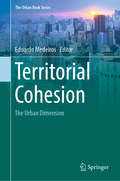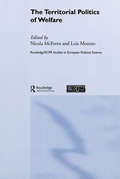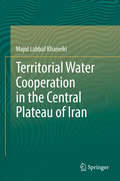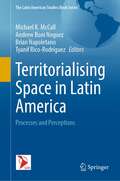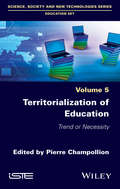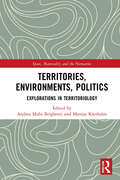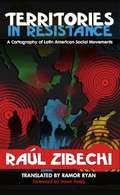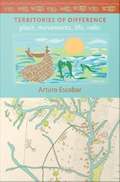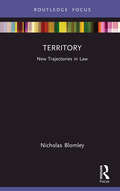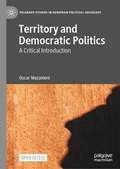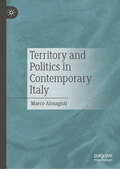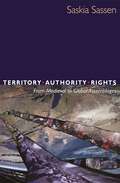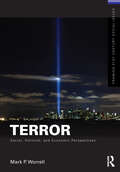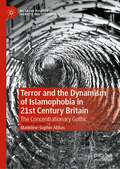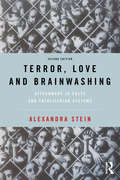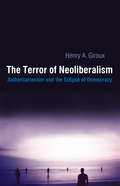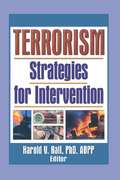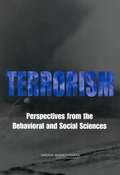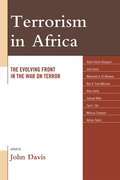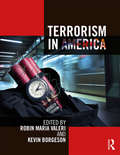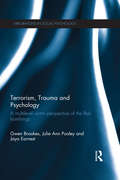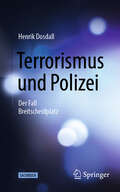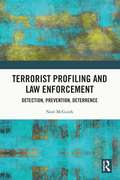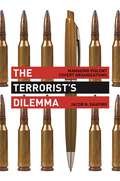- Table View
- List View
Territorial Cohesion: Cohesion, Development, Impact Assessment And Cooperation (Routledge Advances In European Politics Ser.)
by Eduardo MedeirosThis book offers a comprehensive overview of several urban related aspects that are of central importance to successful territorial cohesion processes. In essence, it sheds new light on issues concerning urban polycentrism, functional urban regions, integrated sustainable urban development, and the EU Urban Agenda; and on how they can help to achieve territorial cohesion policy goals. As an elusive and fairly recent concept, territorial cohesion has to date only been vaguely debated in the available literature, which for the most part focuses on its historical origins and its relevance for EU policymaking. Instead, this book synthesizes, for the first time, a range of perspectives that place urban elements and policies at the core of territorial cohesion analysis. As such, and given the fact that territorial cohesion is a holistic concept, the book will appeal to a broad readership from both the academic and policymaking arenas.
The Territorial Politics of Welfare (Routledge/ECPR Studies in European Political Science)
by Nicola Mcewen Luis MorenoThis is a major contribution to our understanding of European integration. It analyzes for the first time, in a highly systematic fashion, European integration as transnational political society formation in a common political space. Four conceptual chapters discuss different approaches to studying European 'transnationalization' including networks and socialization. Six empirical chapters provide in-depth studies of different aspects of this process and policy fields ranging from European party networks and university collaboration to informal economic governance in the Eurozone and police collaboration across borders. This book redresses the excessive concentration in EU research on supranational policy-making and inter-state bargaining. It will be of great interest to political scientists as well as contemporary historians, sociologists and lawyers.
Territorial Water Cooperation in the Central Plateau of Iran
by Majid Labbaf KhaneikiThis book tries to answer the question how different communities in such an arid area as the Iranian central plateau could have shared their limited water resources in a perfect harmony and peace over the course of history. They invented some indigenous technologies as well as cooperative socio-economic systems in order to better adapt themselves to their harsh environment where the scarce water resources had to be rationed among the different communities as sustainably as possible. Those stories hold some lessons for us on how to adjust our needs to our geographical possibilities while living side by side with other people. This work gives insight into the indigenous adaptation strategies through the territorial water cooperation, and describes how water can appear as a ground for cooperation. It explains the water supply systems and social aspects of water in central Iran. Topics include the territorial water cooperation, qanat’s, the traditional water management and sustainability, the socio-economic context, the sustainable management of shared aquifers system and more.
Territorialising Space in Latin America: Processes and Perceptions (The Latin American Studies Book Series)
by Michael K. McCall Andrew Boni Noguez Brian Napoletano Tyanif Rico-RodríguezThe vision of this book is to bring together examples of grounded geographic research carried out in Latin America regarding territorial processes. These encompass a range of histories, processes, strategies and mechanisms, with case studies from ten countries and many regions: struggles to reclaim indigenous lands, conflicts over land/resource/environmental services, competing land claims, urban territorial identities, state power strategies, commercial involvements and others. The case studies included in the book represent a wide diversity of theoretical and methodological framings currently deployed in Latin America to help interpret the patterns and processes through the conceptual lenses of territory, territoriality and territorialization. Interrogating the meanings of territory introduces multiple spatial, socio-cultural and political concepts including space, place and landscape, power, control and governance, and identity and gender.
Territorialization of Education: Trend or Necessity
by Pierre ChampollionThis comprehensive scientific work embraces, within the generic theme of "educations, territorialities and territories", the vast majority of different facets of the complex relationships between educations and territories that have developed over time. It sheds an original light on the many - and, for some, new - interactions between territories-territories, on the one hand, and educations, on the other hand, which have recently been identified and analyzed. Beyond this main objective, it contributes to improving the fine and differentiated understanding of the concept of territory in the sciences of education and training and, more importantly, it brings innovative developments to the still embryonic theorization of the complex relations between educations. and territories-territorialities. This book shows, in particular, through its surveys, its analyzes and its results, that within all the multiple influences attributed to the different dimensions of the territories, the very discrete territoriality - falling within the symbolic territory - is perhaps finally the the most important territorial vector in terms of education in certain areas (rural Montagnards, for example), particularly as regards educational and vocational guidance, but not only. Lastly, it is not uninteresting to note that the theme it bears is spreading more and more today beyond scientific circles: the problem of inequalities in education and orientation of territorial origin is fueling - recently - the controversies and the reflections of the French educational policy which is thus sometimes echoed - in declarative terms essentially for the moment! - scientific advances in this area
Territories, Environments, Politics: Explorations in Territoriology
by Andrea Mubi BrighentiThis collection seeks to illustrate the state of the art in territoriological research, both empirical and theoretical. The volume gathers together a series of original, previously unpublished essays exploring the newly emerging territorial formations in culture, politics and society. While the globalisation debate of the 1990s largely pivoted around a ‘general deterritorialisation’ hypothesis, since the 2000s it has become apparent that, rather than effacing territories, global connections are added to them, and represent a further factor in the increase of territorial complexity. Key questions follow, such as: How can we further the knowledge around territorial complexities and the ways in which different processes of territorialisation co-exist and interact, integrating scientific advances from a plurality of disciplines? Where and what forms does territorial complexity assume, and how do complex territories operate in specific instances? Which technological, political and cultural facets of territories should be tackled to make sense of the life of territories? How and by what different or combined methods can we describe territories, and do justice to their articulations and meanings? How can the territoriological vocabulary relate to contemporary social theory advancements such as ANT, the ontological turn, the mobilities paradigm, sensory urbanism, and atmospheres research? How can territorial phenomena be studied across disciplinary boundaries? Territories, Environments, Politics casts a fresh perspective onto a number of key contemporary socio-spatial phenomena. Refraining from the attempt to ossify territoriology into some disciplinary straightjacket, the collection aims to illustrate the scope of current territoriological research, its domain, its promises, its theoretical advancements, and its methodological reflection in the making. Scholars interested in social research will find in this collection a rich and imaginative theoretical-methodological toolkit. Students in human geography, anthropology and sociology, socio-legal studies, architecture and urban planning will find Territories, Environments, Politics of interest.
Territories in Resistance
by Raul Zibechi Ramor Ryan"Rich and complicated . . . [Territories in Resistance] will be a key reference point in the development of anti-systemic thought."--Gilberto López y Rivas, La Jornada Territories in Resistance is an indispensable complement to existing literature on Latin American autonomous social movements. Explore the "other worlds" being created in the wreckage of colonialism and capitalism. From Mexico, Ecuador, and Colombia to Argentina and Brazil, no living author digs as deep and presents theoretical challenges quite like Raúl Zibechi. Raúl Zibechi is an international analyst for Brecha, a weekly journal in Montevideo, Uruguay, and the author of Dispersing Power: Social Movements as Anti-State Forces (AK Press, 2010).
Territories of Difference: Place, Movements, Life, Redes
by Arturo EscobarIn Territories of Difference, Arturo Escobar, author of the widely debated book Encountering Development, analyzes the politics of difference enacted by specific place-based ethnic and environmental movements in the context of neoliberal globalization. His analysis is based on his many years of engagement with a group of Afro-Colombian activists of Colombia's Pacific rainforest region, the Proceso de Comunidades Negras (PCN). Escobar offers a detailed ethnographic account of PCN's visions, strategies, and practices, and he chronicles and analyzes the movement's struggles for autonomy, territory, justice, and cultural recognition. Yet he also does much more. Consistently emphasizing the value of local activist knowledge for both understanding and social action and drawing on multiple strands of critical scholarship, Escobar proposes new ways for scholars and activists to examine and apprehend the momentous, complex processes engulfing regions such as the Colombian Pacific today. Escobar illuminates many interrelated dynamics, including the Colombian government's policies of development and pluralism that created conditions for the emergence of black and indigenous social movements and those movements' efforts to steer the region in particular directions. He examines attempts by capitalists to appropriate the rainforest and extract resources, by developers to set the region on the path of modernist progress, and by biologists and others to defend this incredibly rich biodiversity "hot-spot" from the most predatory activities of capitalists and developers. He also looks at the attempts of academics, activists, and intellectuals to understand all of these complicated processes. Territories of Difference is Escobar's effort to think with Afro-Colombian intellectual-activists who aim to move beyond the limits of Eurocentric paradigms as they confront the ravages of neoliberal globalization and seek to defend their place-based cultures and territories.
Territory: New Trajectories in Law (New Trajectories in Law)
by Nicholas BlomleyThis book introduces readers to the concept of territory as it applies to law while demonstrating the particular work that territory does in organizing property relations. Territories can be found in all societies and at all scales, although they take different forms. The concern here is on the use of territories in organizing legal relations. Law, as a form of power, often works through a variety of territorial strategies, serving multiple legal functions, such as attempts at creating forms of desired behaviour. Landed property, in Western society, is often highly territorial, reliant on sharply policed borders and spatial exclusion. But rather than thinking of territory as obvious and given or as a natural phenomenon, this book focuses particularly on its relation to property to argue that territory is both a social product, and a specific technology that organizes social relations. That is: territory is not simply an outcome of property relations but a strategic means by which such relations are communicated, imagined, legitimized, enforced, naturalized and contested. Accessible to students, this book will be of interest to those working in the areas of sociolegal studies, geography, urban studies, and politics.
Territory and Democratic Politics: A Critical Introduction (Palgrave Studies in European Political Sociology)
by Oscar MazzoleniThe book provides a comprehensive and updated introduction to concept of territory in the study of democratic politics. Territory plays a rather marginal role in the traditional conceptions of democracy that in many ways still prevail today. Democratic politics is often analysed from the point of view of its institutions, citizens and voters, while little is said about the territory through which it is expressed – at most it provides a broader perimeter or context of political and institutional action. The book offers, instead, an introductory theoretically-oriented discussion of crucial issues such as the genesis of state-nation, the transformation of democratic citizenship, the current borders’ policies, the rising of territorial populism and the experience of 19-covid pandemic.This is an open access book.
Territory and Politics in Contemporary Italy
by Marco AlmagistiThe book is structured around a coherent central theme: the cultural and social basis of democracy in the Italian experience. In particular, it discusses the Italian political system, since Italy is the only country to have experienced the entire party system collapse and facing a crisis that seems endless. This work examines Italian democracy focusing on its territorial dynamics throughout the last two centuries. From the particular context of Italian democracy, the author explores the new cleavage that advances in all consolidated democracies and identifies the reasons for its present crisis and possible ways out.
Territory, Authority, Rights: From Medieval to Global Assemblages
by Saskia SassenWhere does the nation-state end and globalization begin? In Territory, Authority, Rights, one of the world's leading authorities on globalization shows how the national state made today's global era possible. Saskia Sassen argues that even while globalization is best understood as "denationalization," it continues to be shaped, channeled, and enabled by institutions and networks originally developed with nations in mind, such as the rule of law and respect for private authority. This process of state making produced some of the capabilities enabling the global era. The difference is that these capabilities have become part of new organizing logics: actors other than nation-states deploy them for new purposes. Sassen builds her case by examining how three components of any society in any age--territory, authority, and rights--have changed in themselves and in their interrelationships across three major historical "assemblages": the medieval, the national, and the global. The book consists of three parts. The first, "Assembling the National," traces the emergence of territoriality in the Middle Ages and considers monarchical divinity as a precursor to sovereign secular authority. The second part, "Disassembling the National," analyzes economic, legal, technological, and political conditions and projects that are shaping new organizing logics. The third part, "Assemblages of a Global Digital Age," examines particular intersections of the new digital technologies with territory, authority, and rights. Sweeping in scope, rich in detail, and highly readable, Territory, Authority, Rights is a definitive new statement on globalization that will resonate throughout the social sciences.
Terror: Social, Political, and Economic Perspectives (Framing 21st Century Social Issues)
by Mark WorrellAbout the Series The goal of this new, unique Series is to offer readable, teachable "thinking frames" on today’s social problems and social issues by leading scholars, all in short 60-page-or-shorter formats, and available for view on http://routledge.customgateway.com/routledge-social-issues.html. For instructors teaching a wide range of courses in the social sciences, the Routledge Social Issues Collection now offers the best of both worlds: originally written short texts that provide "overviews" to important social issues as well as teachable excerpts from larger works previously published by Routledge and other presses. About the Book In this short text, Worrell shines a unique, unorthodox light on ‘Terror’ from the standpoint of critical social theory. He explains how the social, political and economic effects of terrorism fit into the dynamics and structures of the modern world as a whole.
Terror and the Dynamism of Islamophobia in 21st Century Britain: The Concentrationary Gothic (Palgrave Politics of Identity and Citizenship Series)
by Madeline-Sophie AbbasThis book provides powerful insights into the dynamics, nature, and experiences of the terrors of counter-terrorism measures in the UK. Abbas links her analysis to wider concerns of nation construction and belonging; racial profiling and policing; the state of exception and pre-emptive counter-terrorism measures; community-based counter-terrorism measures; and restrictions to political engagement, freedom of speech and hate speech. What makes this work distinct is its advancement of an original framework - the Concentrationary Gothic - to delineate the racialised mechanisms of terror involved in the governance of Muslim populations in the ‘war on terror’ context. The book illuminates the various ways in which Muslims in Britain experience terror through racialised surveillance and policing strategies operating at state, group (inter- and intra-), and individual levels in diverse contexts such as the street, workplace, public transport and the home. Abbas situates these experiences within wider racial politics and theory, drawing connections to anti-Semitism, anti-blackness, anti-Irishness and whiteness, to provide a complex mapping of the ways in which racial terror has operated in both historical and contemporary contexts of colonialism, slavery, and the camp, and offering a unique point of analysis through the use of Gothic tropes of haunting, monstrosity and abjection. This vital work will be of interest to students and scholars across sociology, criminology, anthropology, terrorism studies, Islamic studies, and critical Muslim studies, researching race and racialisation, security, immigration, nationhood and citizenship.
Terror, Love and Brainwashing: Attachment in Cults and Totalitarian Systems
by Alexandra SteinWritten by a cult survivor and renowned expert on cults and totalitarianism, Terror, Love and Brainwashing draws on the author’s 25 years of study and research to explain how almost anyone, given the right set of circumstances, can be radically manipulated to engage in otherwise incomprehensible and often dangerous acts. Illustrated with compelling stories from a range of cults and totalitarian systems, from religious to political to commercial, the book defines and analyses the common and identifiable traits that underlie almost all these groups. It focuses on how charismatic, authoritarian leaders control their followers’ attachment relationships via manipulative social structures and ideologies so that, emotionally and cognitively isolated, they become unable to act in their own survival interests. Using the evolutionary theory of attachment to demonstrate the psychological impact of these environments, and incorporating the latest neuroscientific findings, Stein illustrates how the combined dynamic of terror and ‘love’ works to break down people’s ability to think and behave rationally. From small local cults to global players like ISIS and North Korea, the impact of these movements is widespread and growing. This important book offers clarity and a unique perspective on the dynamics of these systems of control, and concludes with guidance to foster greater awareness and prevention. It will be essential reading for mental health professionals in the field, as well as policy makers, legal professionals, cult survivors, and their families, as well as anyone with an interest in these disturbing groups. Students of social and developmental psychology will also find it fascinating.
Terror, Love and Brainwashing: Attachment in Cults and Totalitarian Systems
by Alexandra SteinThis book explains how people can be radically manipulated by extreme groups and leaders to engage in incomprehensible and often dangerous acts through psychologically isolating situations of extreme social influence. These methods are used in totalitarian states, terrorist groups and cults, as well as in controlling personal relationships. Illustrated with compelling stories from a range of cults and totalitarian systems, Stein's book defines and analyses the common identifiable traits that underlie these groups, emphasizing the importance of maintaining open yet supportive personal networks. Using original attachment theory-based research this book highlights the dangers of closed, isolating relationships and the closed belief systems that justify them, and demonstrates the psychological impact of these environments, ending with evidence-based recommendations to support an educational approach to awareness and prevention. Featuring a foreword by John Horgan, the new edition has been fully updated to include recent work on political extremism and radicalization and totalitarian systems, as well as the recent highly publicized NXIVM case. Terror, Love and Brainwashing, second edition is essential reading for professionals, policy makers, legal professionals, educators and cult survivors and their families themselves.
Terror of Neoliberalism: Authoritarianism and the Eclipse of Democracy (Cultural Politics And The Promise Of Democracy Ser.)
by Henry A. GirouxThis book argues that neoliberalism is not simply an economic theory but also a set of values, ideologies, and practices that works more like a cultural field that is not only refiguring political and economic power, but eliminating the very categories of the social and political as essential elements of democratic life. Neoliberalism has become the most dangerous ideology of our time. Collapsing the link between corporate power and the state, neoliberalism is putting into place the conditions for a new kind of authoritarianism in which large sections of the population are increasingly denied the symbolic and economic capital necessary for engaged citizenship. Moreover, as corporate power gains a stranglehold on the media, the educational conditions necessary for a democracy are undermined as politics is reduced to a spectacle, essentially both depoliticizing politics and privatizing culture. This series addresses the relationship among culture, power, politics, and democratic struggles. Focusing on how culture offers opportunities that may expand and deepen the prospects for an inclusive democracy, it draws from struggles over the media, youth, political economy, workers, race, feminism, and more, highlighting how each offers a site of both resistance and transformation.
Terrorism: Strategies for Intervention
by Harold Hall VAn essential resource for anyone working against terrorism in any form it may take! Written for threat assessment professionals in the post-9/11 era, this timely book will help you understand the motivation to commit acts of terror, the thinking patterns common to many terrorists, the psychology of Muslim fundamentalists, methods for predicting the likelihood of chemical/biological attacks, and a great deal more. You&’ll learn about hostage/barricade situations and the role of the crisis negotiator, including victim/perpetrator psychology and factors that indicate progress is being made in a crisis negotiation and factors that imply imminent lethality. After reading Terrorism: Strategies for Intervention, you&’ll have a better understanding of: biological, social, and psychological constructs that are important to understanding group violence the role of emotions in violence the history of chemical/biological weapons use from 1978 to the present, and methods of predicting the likelihood and origins of such attacks the importance of concurrent sequences in relation to chemical/biological attacks hostage/barricade situations, the makeup of crisis negotiation teams, and the role of the crisis negotiator hostage incident databases-where to find them, what they contain, and how they can be used effectively six different types of hostage takers and what strategies have the best chance of bringing each type&’s crises to an end factors that indicate progress is being made in a crisis negotiation and factors that imply imminent lethality ethical concerns for forensic consultants when dealing with the issues surrounding terrorism Here is a sample of what you&’ll find in this informative and well-referenced book: "Terrorism as Group Violence" illustrates the complexity of terrorism and the need to consider the interplay of biological, social, and psychological influences on terrorist behavior. This chapter identifies the constructs and data generated by theories of violence that are relevant to terrorism. Next, profiles of terrorists&’ motivations are scrutinized, followed by a probing of the specific patterns of thinking salient to their motivations. Finally, approaches to solving the terrorist problem are framed. Five handy tables make important points easy to access and understand. "Chemical and Biological Violence: Predictive Patterns in State and Terrorist Behavior" is essential reading for any serious evaluator of chemical and biological weapons. This chapter uses the Lethal Violence Sequence as a means to help predict chemical/biological weapons use by religious and ethno-nationalist terrorist groups. It includes case vignettes, data categories that can help make predictions more accurate, and a discussion of solutions for use by individuals, law enforcement and federal anti-terrorist agencies, as well as manufacturers and other industry entities, plus a consideration of government and international efforts. "Negotiating Crises: The Evolution of Hostage/Barricade Crisis Negotiations" examines multiple ways by which a crisis incident can be classified, analyzes the results of hostage incident databases, discusses negotiation techniques, and explores the impact of captivity on the victim. The author reveals important characteristics of hostage/barricade situations that can be vital to the success of the evaluator/negotiator. Six informative tables in this section make statistics and procedures easy to understand. "Ethical Concerns in Forensic Consultation Regarding National Safety and Security" provides an essential overview of the ethical challenges that mental health professionals and behavioral scientists face when they consult on matters of national security and safety. This chapter delivers useful guidance for professionals who
Terrorism: Perspectives from the Behavioral and Social Sciences
by Neil J. Smelser Faith MitchellThe events and aftermath of September 11, 2001, profoundly changed the course of history of the nation. They also brought the phenomenon known as terrorism to the forefront of the nation's consciousness. As it became thus focused, the limits of scientific understanding of terrorism and the capacity to develop policies to deal with it became even more evident. The objective of this report is to bring behavioral and social science perspectives to bear on the nature, determinants, and domestic responses to contemporary terrorism as a way of making theoretical and practical knowledge more adequate to the task. It also identifies areas of research priorities for the behavioral and social sciences.
Terrorism in Africa: The Evolving Front in the War on Terror
by John DavisTerrorism in Africa: The Evolving Front in the War on Terrorism, represents a research endeavor aimed at increasing scholarly discourse on the ever-expanding threat of terrorism and terrorist-related violence in the region. It's analysis of the sub-national and transnational terrorists groups that have made Africa the second most violent region in the world. <P><P>This analysis of the states, terrorist groups, and critical issues that have increased the specter of terrorism in Africa. (1) the diversity of the terrorist threat among states in the region, (2) the regional dynamics and the local response to terrorism, and (3) regional solutions to the threat of terrorism in Africa.
Terrorism in America
by Robin Maria Valeri Kevin Borgeson<p>Offering a fresh perspective on the changing face of terror attacks, Terrorism in America focuses on domestic groups, examining the beliefs, actions, and impacts of American-based terrorists and terror organizations. Editors Robin Valeri and Kevin Borgeson and their contributors draw on theories from criminology, psychology, and sociology to explore the ideologies of right-wing, left-wing, and extremist religious groups—how and why they convert followers, recruit financially, and take extreme action against others. No competing text offers such in-depth and nuanced coverage of the radical ideologies behind these attacks, or the ensuing fear domestic terrorism creates, as well as the strategies to combat violent extremism. <p>A core text for domestic terrorism courses and an excellent supplement for any counterterrorism or homeland security course, Terrorism in America brings its singular focus to the growth and evolution of terrorism in the United States. Interviews, case studies from the field, and chapter themes make this a highly readable text for criminal justice, psychology, sociology, and homeland security students, professors, or practitioners.</p>
Terrorism, Trauma and Psychology: A multilevel victim perspective of the Bali bombings (Explorations in Social Psychology)
by Gwen Brookes Julie Ann Pooley Jaya EarnestThis book provides a comprehensive insight into the multilayered effects experienced by directly affected victims and their indirectly affected family members following terrorist incidents and other world disasters. Chapters draw primarily on interviews with fifty victims of the Bali bombings, but also consider terrorist incidents including the London and Boston bombings, and disasters such as the Boxing Day tsunami and the Fukusima nuclear disaster. The book provides a detailed exploration of experiences and perceptions of those involved in the traumatic events, as well as their families, emergency response teams and community volunteers. Chapters discuss community responses to major incidents, appropriate non-medical models of intervention and vulnerable groups that may require special attention. The findings and analysis presented contribute to our understanding of the multilayered effects of terrorism on victims of all levels, and the importance of a planned and informed response, which includes the local community and its wealth of pre-existing resources. Terrorism, Trauma and Psychology: A multilevel victim perspective of the Bali bombing will be key reading for researchers and academics in the fields of social and clinical psychology, as well as scholars of victimology and terrorism studies.
Terrorismus und Polizei: Der Fall Breitscheidplatz
by Henrik DosdallDer schwerste islamistische Anschlag in der Geschichte der Bundesrepublik – der Anschlag auf den Berliner Breitscheidplatz – hat eine Besonderheit: verschiedene Polizeien ermittelten über Monate gegen den späteren Täter, stellten ihre Ermittlungen dann aber Monate vor dem Anschlag ein. Wie kam es zu dieser Einstellung? Und wie ermitteln Polizeien überhaupt im Bereich Terrorismus? Handelt es sich um einen eklatanten Fall von Behördenversagen? Oder waren andere Gründe ausschlaggebend für die Einstellung? Was verrät uns der Fall über die Herausforderungen, die sogenannte Einzeltäter*innen für die Polizei? Das vorliegende Buch nimmt diese Fragen aus einer informierten soziologischen Perspektive auf.
Terrorist Profiling and Law Enforcement: Detection, Prevention, Deterrence
by Noel McGuirkThis book analyses the usefulness of terrorist profiling utilised by law enforcement officers as a pre-emptive means to assist them in the detection, prevention and deterrence of terrorism and/or its preparatory activities. It explores two main themes arising from the phenomenon of terrorist profiling: the lawfulness of terrorist profiling and the utility of profiling. These two themes are explored in three separate parts. Firstly, the book begins by drawing upon human rights concerns arising from the use of terrorist profiling by law enforcement officers. Secondly, an analytical framework capable of making determinations on the usefulness of terrorist profiling. This framework develops a profiling spectrum that ranges from formal and informal manifestations of terrorist profiling that forms the basis for evaluating its usefulness. Finally, the book presents an examination of various manifestations of terrorist profiling by separating the analysis of the ‘construction’ of profiles on the one hand, from their ‘application,’ on the other, so as to be able to identify and examine profiling’s usefulness as a technique to assist law enforcement officers make predictions about likely offender characteristics. This book ultimately concludes that terrorist profiling should only be conducted by undertaking a systematic assessment of the construction of profiles separate from the application of profiles whilst simultaneously taking into account fundamental human rights concerns with the practice of terrorist profiling. The work will be an essential resource for academics, law enforcement officers and lawyers in the disciplines of law, criminology, human rights, criminal justice and policing. As the book engages with terrorist profiling, it will also be of interest to those engaged in the psychology of terrorism.
The Terrorist's Dilemma: Managing Violent Covert Organizations
by Jacob N. ShapiroA comprehensive look at how terrorist groups organize themselvesHow do terrorist groups control their members? Do the tools groups use to monitor their operatives and enforce discipline create security vulnerabilities that governments can exploit? The Terrorist's Dilemma is the first book to systematically examine the great variation in how terrorist groups are structured. Employing a broad range of agency theory, historical case studies, and terrorists' own internal documents, Jacob Shapiro provocatively discusses the core managerial challenges that terrorists face and illustrates how their political goals interact with the operational environment to push them to organize in particular ways.Shapiro provides a historically informed explanation for why some groups have little hierarchy, while others resemble miniature firms, complete with line charts and written disciplinary codes. Looking at groups in Africa, Asia, Europe, and North America, he highlights how consistent and widespread the terrorist's dilemma--balancing the desire to maintain control with the need for secrecy--has been since the 1880s. Through an analysis of more than a hundred terrorist autobiographies he shows how prevalent bureaucracy has been, and he utilizes a cache of internal documents from al-Qa'ida in Iraq to outline why this deadly group used so much paperwork to handle its people. Tracing the strategic interaction between terrorist leaders and their operatives, Shapiro closes with a series of comparative case studies, indicating that the differences in how groups in the same conflict approach their dilemmas are consistent with an agency theory perspective.The Terrorist's Dilemma demonstrates the management constraints inherent to terrorist groups and sheds light on specific organizational details that can be exploited to more efficiently combat terrorist activity.
